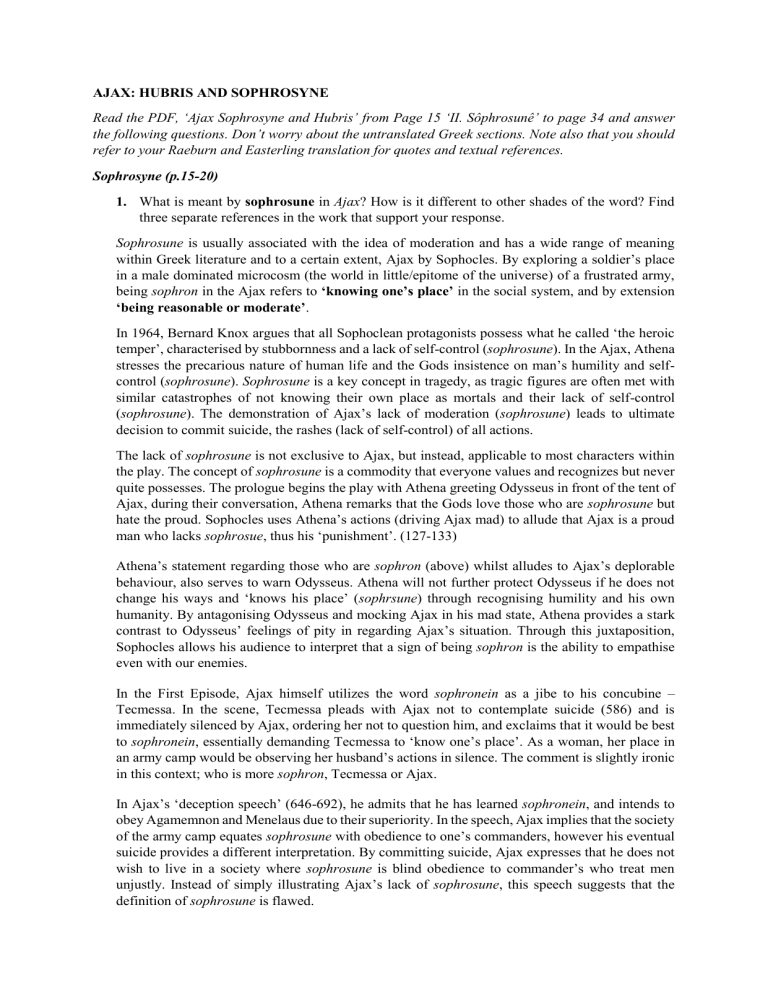
AJAX: HUBRIS AND SOPHROSYNE Read the PDF, ‘Ajax Sophrosyne and Hubris’ from Page 15 ‘II. Sôphrosunê’ to page 34 and answer the following questions. Don’t worry about the untranslated Greek sections. Note also that you should refer to your Raeburn and Easterling translation for quotes and textual references. Sophrosyne (p.15-20) 1. What is meant by sophrosune in Ajax? How is it different to other shades of the word? Find three separate references in the work that support your response. Sophrosune is usually associated with the idea of moderation and has a wide range of meaning within Greek literature and to a certain extent, Ajax by Sophocles. By exploring a soldier’s place in a male dominated microcosm (the world in little/epitome of the universe) of a frustrated army, being sophron in the Ajax refers to ‘knowing one’s place’ in the social system, and by extension ‘being reasonable or moderate’. In 1964, Bernard Knox argues that all Sophoclean protagonists possess what he called ‘the heroic temper’, characterised by stubbornness and a lack of self-control (sophrosune). In the Ajax, Athena stresses the precarious nature of human life and the Gods insistence on man’s humility and selfcontrol (sophrosune). Sophrosune is a key concept in tragedy, as tragic figures are often met with similar catastrophes of not knowing their own place as mortals and their lack of self-control (sophrosune). The demonstration of Ajax’s lack of moderation (sophrosune) leads to ultimate decision to commit suicide, the rashes (lack of self-control) of all actions. The lack of sophrosune is not exclusive to Ajax, but instead, applicable to most characters within the play. The concept of sophrosune is a commodity that everyone values and recognizes but never quite possesses. The prologue begins the play with Athena greeting Odysseus in front of the tent of Ajax, during their conversation, Athena remarks that the Gods love those who are sophrosune but hate the proud. Sophocles uses Athena’s actions (driving Ajax mad) to allude that Ajax is a proud man who lacks sophrosue, thus his ‘punishment’. (127-133) Athena’s statement regarding those who are sophron (above) whilst alludes to Ajax’s deplorable behaviour, also serves to warn Odysseus. Athena will not further protect Odysseus if he does not change his ways and ‘knows his place’ (sophrsune) through recognising humility and his own humanity. By antagonising Odysseus and mocking Ajax in his mad state, Athena provides a stark contrast to Odysseus’ feelings of pity in regarding Ajax’s situation. Through this juxtaposition, Sophocles allows his audience to interpret that a sign of being sophron is the ability to empathise even with our enemies. In the First Episode, Ajax himself utilizes the word sophronein as a jibe to his concubine – Tecmessa. In the scene, Tecmessa pleads with Ajax not to contemplate suicide (586) and is immediately silenced by Ajax, ordering her not to question him, and exclaims that it would be best to sophronein, essentially demanding Tecmessa to ‘know one’s place’. As a woman, her place in an army camp would be observing her husband’s actions in silence. The comment is slightly ironic in this context; who is more sophron, Tecmessa or Ajax. In Ajax’s ‘deception speech’ (646-692), he admits that he has learned sophronein, and intends to obey Agamemnon and Menelaus due to their superiority. In the speech, Ajax implies that the society of the army camp equates sophrosune with obedience to one’s commanders, however his eventual suicide provides a different interpretation. By committing suicide, Ajax expresses that he does not wish to live in a society where sophrosune is blind obedience to commander’s who treat men unjustly. Instead of simply illustrating Ajax’s lack of sophrosune, this speech suggests that the definition of sophrosune is flawed. 2. In what ways does sophrosyne relate to the characters of Ajax, Odysseus, Tecmessa? How does it relate to a military camp? (1075 approx.) Sophrosyn with the definition of ‘knowing one’s place’ is largely applicable and related to the characters of Ajax, Odysseus and Tecmessa along with the military camp. It is thoroughly discussing within the previous question. Ajax: refers to ‘knowing one’s place’ in the social system, and by extension ‘being reasonable or moderate’. Ajax is clearly neither as he commits the rashest decisions, such as his ‘rage’ for Odysseus, Menelaus and Agamemnon that leads to his decision to slaughter them. Furthermore, the concept of Sophrosyn is further emphasise after Ajax’s realisation; that he has been deceived by Athena to slaughter sheep. His shame from his action leads to his ultimate suicide, highlighting his lack of moderation and self-control. - Odysseus: Athena’s spiel regarding those who are sophron and her allusions to Ajax’s deplorable behaviour, serves to warn Odysseus also. Athena intones that she will no longer protect Odysseus if he does not change his ways and ‘knows his place’ (sophrsune) through recognising humility and his own humanity. In the end, Odysseus’ feelings of pity in relation to Ajax’s situation expresses Sophocles’ views that a sign of being sophron is the ability to empathise even with our enemies. - Tecmessa: As a woman, her place in an army camp would be observing her husband’s actions in silence, thus she should be sophronein, essentially demanding Tecmessa to ‘know one’s place’. - Military Camp: In his Deception Speech, Ajax implies that the society of the army camp equates sophrosune with obedience to one’s commander, however his suicide after his speech, his implications could be read as Ajax’s refusal to live in a society where sophrosune is blind obedience to commander’s who treat men unjustly. The irony of these circumstances highlights the importance of this correlation and draws audience’s attention to Sophocles’ suggestion that the definition of sophrosune is flawed. 3. How is Ajax’s ‘deception speech’ (646-693) about sophrosyne? Why do you think is it called the ‘deception speech’? - Prior to Ajax’s ‘Deception Speech’ the hero laments his parlous state of ignominy upon recovering his sanity, providing clear indications that he will take his own life and retires into his tent and brushes aside the entreaties of his concubine Tecmessa. The chorus reflects appropriately and sings songs of sorrow and patiently waits for the news of Ajax’s impending death. However, Ajax, through a sudden twist, emerges from his tent and declares through his ‘Deception Speech’ that his mind has been altered and makes peace with Athena, the other Gods, and the Atreidae. With an ecstatic response from the chorus, Ajax goes off to the seashore for his purification rites. This us soon muted by the arrival of a messenger, who reports that Ajax could only be saved if he stays home for this one day. The chorus and Tecmessa hurry off as a search party. The hero then reappears on an empty stage, offering no explanations or introductions, just a bitter speech, falls on his swords as the myth. Ajax’s deliverance of his ‘Deception Speech’ remains a controversy, as the question of why Sophocles essentially ‘deceived’ his audience remains a mystery. However, an interpretation has been offered to answer this controversy. Ajax admits within his speech that he has learned sophronein and intends to obey Agamemnon and Menelaus due to their superiority. In the speech, Ajax implies that the society of the army camp equates sophrosune with obedience to one’s commanders, however, his implication was undermined by his ultimate death via suicide. Through this ironic speech and his subsequent death, Ajax expresses that he does not wish to live in a society where sophrosune is blind obedience to commander’s who treat men unjustly. Hubris (p.20-31) 4. Is it sufficient to define hubris as ‘insolence or pride’? 5. What is hubris, ‘properly speaking’ (ex. It was used as a legal term for rape)? Many scholastic articles outline hubris as the key to understanding the ‘tragic hero’ of a Greek Tragedy, defining hubris to be a character flaw insolence or pride that causes a tragic hero to meet their ultimate downfall. This is presented and expressed in the Ajax through Athena’s spiel that dictates the inescapable principle, that the arrogant or excessive must be brought down and made to suffer and it repetition by Calchas (758-761). Calchas even further highlights Ajax’s hubris through two past examples of Ajax’s action (762-9 and 770-5), solidifying that hubris is an inherent character trait, suggesting that Ajax’s crimes might be a symptom of his character. Hubris within these contexts are also presented through Ajax’s arrogant attitude towards Athena, amounting to religious hubris. However, his acts of self-assertion in relation to other mortals are not tantamount to hubris nor does this reflect the negative aspects of a hero. Thus, the Greek work hubris is, a kind of outrage one commits against someone else, whether verbal or physical. In fact, the word was used as an Ancient Greek legal term for rape. In this instance, the concept that hubris means insolence or pride is inappropriate for the Ajax and does not necessarily match the Greek text, thus making it insufficient to define hubris as ‘insolence or pride’. Hubris as a theme within the Ajax, refers to the cycle of violence and anger among the Greek warriors or the political aspirations of the sons of Atreus. Using this precise context of hubris, it could be argued that the play is a tragedy of hubris; Ajax is a victim of his own code of honour as he acts accordingly, disregarding the consequences of his actions. It could also be observed that hubris is a term that describes the evil one character enacts against another, yet it is never used to qualify Ajax’s attitude towards the Gods, solidifying the superiority and importance of the Gods during ancient times. 6. Is hubris a character flaw of Ajax? Ajax’s arrogant attitude towards Athena could be amounted religious hubris. However, his acts of self-assertion in relation to other mortals are not tantamount to hubris nor does this reflect the negative aspects of a hero. Furthermore, the context in which the word hubris is interpreted within the Ajax refers to a kind of outrage one commits against someone else, whether verbal or physical. Thus, hubris is not a character flaw of Ajax. 7. How is the heroism inspired by the warriors of the past hubristic? By defining hubris as a soldier-like, warlike behaviour inspired by past heroic values, it could be argued that Ajax is in fact characterised by hubris, leading to the conclusion that heroism inspired by the warriors of the past is hubristic. Odysseus’ representation of a co-operative system of values is thus incompatible and considered hubristic or intolerable. 8. Does Ajax commit hubris towards Athena? Ajax commits hubris towards Athena through his arrogant attitude towards the goddess, amounting to religious hubris, as it is outrageous for a mortal to show disrespect towards an immortal. 9. Give three separate examples of hubris from the play. It is first invoked y the chorus comprising of soldiers from Salamis. The chorus discussed Ajax’s mad spree and described the hubris of the Greeks against Ajax, referencing their malice and insulting of Ajax’s name (151-53). The mention of hubris here by the chorus describes the malice of his comrades instead of Ajax, thus solidifying the above definition of hubris. Ironically, it could be interpreted that it is the gossiping Greeks who have hubris, as the contribute to the ‘cycle of violence and anger’ prevalent within the play. In a later scene, Ajax comes out of his tent and laments that he is being hubrised referring to the Greeks outraging him with their incessant gossips. Another scene that exemplifies the Greek soldier’s hubristic nature is when Ajax speaks to Eurysaces; he reassures that even though everyone is laughing at him (hubris) none of the Greeks in the future will offer hubris to him (Eurysaces) with insults (560). The next mention of hubris is during interactions between Ajax and his concubine Tecmessa. Tecmessa compares Ajax’s behaviour to his maddened state, whipping flocks of sheep and thinking he was paying hubris to his enemies (304). Within this scene, the semantics of hubris is presented as physical violence. Even after Ajax’s suicide, the chorus finds his body and assume that Odysseus will be the first to ephubrizein (show hubris in) his heart (956). In the following line (957), the chorus exclaims that Odysseus will laugh at their maddening pain. Odysseus’ hubris towards Ajax is somewhat a reasonable expectation, as he was an intended victim of Ajax’s violence (hubris), reflecting Ancient Greece ethics that one expects enemies to repay evil for evil. Most invocations of the concept of hubris that reflects the violence that Ajax was planning to exert on his enemies occurs after his death. Menelaus reminds audience how Ajax was driven mad (1060) and re-emphasized that the God’s drove away Ajax’s hubris from its intended targets (Menelaus, Odysseus and Agamemnon). At the end of his discourse regarding how fear of authority gives an army its cohesion and the sophronos of soldiers, Menelaus also taunts Ajax as a hubristes, ‘committer of hubris’. 10. Is failure to bury the corpse of Ajax hubristic? The act itself of not burying a corpse on purpose is essentially hubristic in Ancient Greece as the Gods considered it a disrespect and outrage. The failure to bury the corpse of Ajax specifically, exacerbates the situation due to his social rank and his contributions as a soldier, it shows hubris towards the army Ajax commanded and his family. 11. [Around page 27]- How is Menelaus’ understanding of power problematic as it relates to 5th. Century Athens? Menelaus’ argument that an army or a state’s ability to be ruled sophronos is dependent on the obedience of subordinates to their superiors (1069-78) is not an unusual Greek thought. It was considered a norm that the notion of fear (phobos and deos) and shame (aidos) is what keeps society in order. This societal norm is reflected in Plato’s first book of his Republic, it recounts one of Socrates’ famous dialogues that took place during Sophocles’ lifetime. In the dialogue, Plato utilises the character Thrasymachus to defend the cynical argument that ‘justice’ is nothing more than the will the desires of those in power (Republic 343b-344c). Plato further suggests that a subject serves the interest of his ruler through his own expense, thus arguing that ‘justice’ always operates to the advantage of the ruler, not the subject (343c). Even thought this argument is subsequently proved invalid by the character of Socrates, the Republic engages with the ethical and moral issues of political power by emphasising the necessity of obedience to power, highlighting the obligations of those who rule. Thus, it could be argued that Menelaus’ lengthy discourse reflects common Greek social questions and anxieties regarding power relationships. Evidently Menelaus’ understanding of power, albeit problematic due to its disturbingly aristocratic values regarding class, relates to 5th Century Athens. Sophocles composed the Tragedy during one of the many religious festivals in democratic Athens, the play would have been on display for all citizens; as religious festivals were considered mandatory for a model Athenian, and foreign guests. It is important to note that during that time, Athenians largely attributed their increasing success in controlling Greek affair to the superiority of their democratic constitution. Democracy in ancient Greece was structured on the equal participation of Athenian men in the government and bureaucracy, regardless of wealth and family connections. To show his support and celebration of democracy, Sophocles uses antagonistic characters within his Tragedy to express aristocratic sentiment, signalling his denunciation of those values. Menelaus’ speech speaks of demotes (common man 1071), a word derived from the word demos. Coincidentally, the word demos is the root of the word democracy. Menelaus’ insistence that a demotes who dares to disobey his superiors is evil provides context that reflects the unruly army outside the walls of Troy but juxtaposes the political environment of democratic Athens. 12. Does Menelaus commit hubris when he refuses to bury Ajax’s body? Menelaus ends his speech with a command to not bury Ajax’s body, threatening Teucer with death if he attempts to do so (1089). The chorus reflects their disapproval, describing Menelaus to be hubris, warning him that although his argument is wise, it will be an act of hubris to leave a soldier’s body unburied (1091). Teucer himself makes a similar argument, claiming that even if Menelaus’ political ideals were correct, Ajax was not his subordinate, his efforts as a soldier and his command over his own men has earned him a proper burial (1099-1101). Like the chorus, Teucer castigates Menelaus’ hubris behaviour. In a later scene, Agamemnon, outraged with Teucer’s inability to show sophrosune, due to his lack of social status, accuses Teucer of committing hubris. In this passage, hubris is equated with verbal abuse, either mocking or implying a speech that goes beyond social limits. In conclusion, Menelaus does commit hubris due to his refusal to bury Ajax’s body, as hubris refers to an outrage caused by one to another. Thus, it could be argued that it is an outrage that Menelaus refuses to bury Ajax, a high ranking warrior, committing outrage against Ajax’s family and the wider community.





